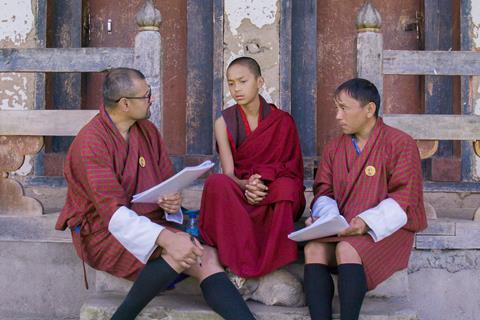Audience-friendly documentary explores the reality of Bhutan’s Gross National Happiness policy

Dirs: Arun Bhattari, Dorottya Zurbo. Bhutan/Hungary. 2024
While, for most, the idea of happiness is an abstract ideological concept, the country of Bhutan views it firmly as a quantifiable commodity. Since its inception in the 1990s, Bhutan has used the Gross National Happiness (GNH) index to guide national policy, so creating a democratic kinship between the state and its people, and a contented population — in theory. As highlighted by this intriguing documentary, the reality is, like happiness itself, rather more unfathomable.
Boasts all the hallmarks of a audience-friendly documentary
Premiering in the World Cinema Documentary competition at Sundance, Agent Of Happiness comes from Bhutanese director Arun Bhattari and Hungarian filmmaker Dorottya Zurbo, whose previous joint feature documentary, 2017’s Bhutan-set The Next Guardian, premiered at IDFA. It boasts all the hallmarks of a audience-friendly documentary; an intriguing story, a likeable protagonist, stunning cinematography and an accessible tone. These elements should see it attract further interest from festivals and events or distributors with a broad global outlook.
Forty-something Amber lives with his ageing mother, and has taken a job as a government agent working to measure people’s happiness. Trekking through the Bhutanese landscape, from remote Himalayan mountain villages to small urban centres, Amber is tasked with asking a cross-section of people various questions and then scoring their overall levels of contentment.
The first interactions are fairly gentle; an 82-year-old farmer is happy because he can spend his days wandering the idyllic landscape, captured in all its lush widescreen glory by Bhattari, who also act as cinematographer. Another young rural family seems content with their lot. But it soon becomes clear the happiness survey is geared towards a certain preconception of satisfaction; interviewees are asked things like the number of cows and tractors they own, which all goes towards the final result.
For some Bhutanese, particularly the younger generation, these are not indicators of happiness. Transgender Dechen, for example, who lives with her supportive but terminally ill mother, longs more for social acceptance than a herd of pigs. Speaking to her mother about her hopes of reincarnation — and traditional Buddhist beliefs and values factor in daily lives to various degrees — she hopes to come back as a “beautiful girl”. Elsewhere, 17 year-old Yangkha cares not for the electrical appliances which score highly on the survey — apart from her phone, on which she watches TikTok — but could do with some support in caring for her alcoholic mother and young sibling, and for realising her own ambitions.
Directors Arun Bhattari and Dorottya Zurbo fully appreciate the problems which lie at the heart of Bhutan’s GNH policy — that it is being carried out in a nation where thousands live in poverty, and many feel they simply don’t fit in. That includes Amber himself, who was born in Bhutan to ethnic Nepali parents, and had his citizenship revoked when his father died at the age of two — something he has been fighting to have returned for years. But the filmmakers never feel the need to bang the political drum. Instead, they let these individual stories speak for themselves, at obvious odds with the utopian propaganda shown in tv news reports and the uplifting pop songs that Amber adores.
Working diligently for the government, collecting data that will help shape the country’s future, Amber’s own prospects are severely limited; his lack of citizenship means he has been unable to find a wife, or even get a meaningful job. Despite his best efforts, his own GNH score is a middling 5 out of 10 — perhaps the greatest embodiment of the cultural and political ironies on display in this heartfelt film.
Production companies: Match Frame Productions
Contact: Match Frame Productions info@matchframe.hu
Producers: Noemi Veroinka Szakonyi, Mate Artur Vincze, Arun Bhattarai
Cinematography: Arun Bhattari
Editing: Peter Sass
Music: Adam Balazs
























